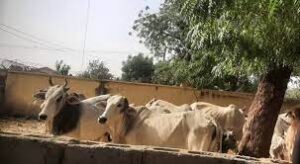The Federal Ministry of Agriculture and Food Security has alerted Nigerians over the outbreak of poison in trade animals at Mandate Cattle Market, located near College of Arabic and Islamic Legal Studies at Adewole, Ilorin, Kwara State.
This was contained in a statement signed by the Permanent Secretary, Federal Ministry of Agriculture and Food Security, Temitope Fashedemi, where it also made it known that the Rapid Response Team, RRT, in Kwara State in collaboration with the State Government’s task force, swiftly swung into action to trace and confiscate the meat from the slaughtered animal and were subsequently disposed in an environmentally friendly manner.
According to the statement, 40 suspected poisoned animals were treated with organophosphate antidotes, and they responded with marked improvement in their health, leading to recovery.

The statement reads in part: “The Federal Ministry of Agriculture and Food Security hereby alerts the General Public on the outbreak of poison in trade animals which occurred at Mandate Cattle Market, located near College of Arabic and Islamic Legal Studies at Adewole, Ilorin, Kwara State.
“According to the report from Kwara State Ministry of Agriculture and Rural Development, mortality in herd occurred at this market on Saturday, 20th April, 2024 and the outcome of the investigation revealed that animals had grazed on the forage that was fumigated with organophosphate chemical prior to the incident.
“The report further stated that clinical signs observed were hypersalivation, weakness, and recumbency. On noticing this, the herders decided to slaughter 7 of the very weakly affected animals for public consumption.
“This has public health risks, and the consequences may be very severe in the food chain.
“It is important to note however, that there is a Rapid Response Team (RRT) in every state of the Federation, made up of Federal Epidemiology Officer, State Director, Veterinary Services and State Epidemiology Officer, who have been adequately trained by the Federal Ministry of Agriculture and Food Security for emergency situations such as this.
“In this particular instance, the RRT in Kwara State in collaboration with the State Government’s task force, swiftly swung into action to trace and confiscate the meat from the slaughtered animal; these were subsequently disposed of in an environmentally friendly manner.
“The report added that 40 suspected poisoned animals were treated with organophosphate antidotes, and they responded with marked improvement in their health, leading to recovery.
“Other actions taken included the following: Cleaning and disinfection of the abattoir that the carcasses were dressed; Creation of public awareness on the danger of consuming the meat from affected slaughter animals was issued; Collection of blood and tissue samples for laboratory testing and analysis.
“To avert the future occurrence of this bad and hazardous agricultural practice, the Ministry wishes to inform the General Public that: There is danger in consuming unwholesome meat and other food of animal origin, especially contaminated with organophosphate.
“Meat for human consumption should be purchased at registered, government/private approved spots such as abattoirs, slaughter slabs, meat shops, etc. Such products must have been certified wholesome, fit for consumption by a registered veterinarian.
“Meat from dead animals is unwholesome and should not be consumed; With a withdrawal period of 14 -21 days after injection, ingestion and / or application of drugs or chemicals preparation on animals should be strictly observed before products from such animals are certified for consumption.
“Dead animals should be properly disposed of with the aid of veterinarians and environmental health officers; Report and diseased animals or suspected to be diseased to the nearest veterinary clinics/hospital or animal health services providers; People who may have genuine reason to apply chemicals on open farmlands or fields should please notify their host communities to avoid grazing animals on such fields for at least one week.”
However, the Ministry assured Nigerians that it will through its Department of Veterinary and Pest Control Services continue to work with States’ Veterinary Services in synergy to ensure that best veterinary and agricultural practices are observed, especially, for disease, agricultural pests and hazard prevention and control, with the professional motive of enhancing animal welfare and ensuring availability of wholesome food of animal origin.




